Knowing how your customers feel about your brand makes growing a business easier and more efficient. With this knowledge, you can finetune your products, go-to-market strategies, marketing campaigns, and other processes for the best possible results. Regularly conducted brand surveys help you gather such feedback.
But brand surveys come in many different forms and choosing the right one is important to reap the benefits of your investments. So here is a guide on how to get it right and use brand surveys the right way for your business.
Table of contents
What is branding and brand identity?
Before we talk about brand surveys, it is important to define the two most important aspects analyzed using them – branding and brand identity.
Branding involves consistently shaping how your core or target audience perceives your brand. These efforts will include various brand strategies to create a strong and memorable brand, capable of making a big impression. Branding allows you to establish and maintain a unique identity that sets your business apart from competitors.
Brand identity is the look and feel of your brand. It includes elements like your brand name, logo, visual imagery, and key messaging symbols that you use to communicate to your customers.
Branding isn’t a one-time effort. To maintain your company’s brand health, you’ll need processes and strategies to measure, track, and manage its impact.
Constant tracking of branding and brand identity helps build trust and loyalty now among your target audience and for the long term. And that is where brand surveys come into play.
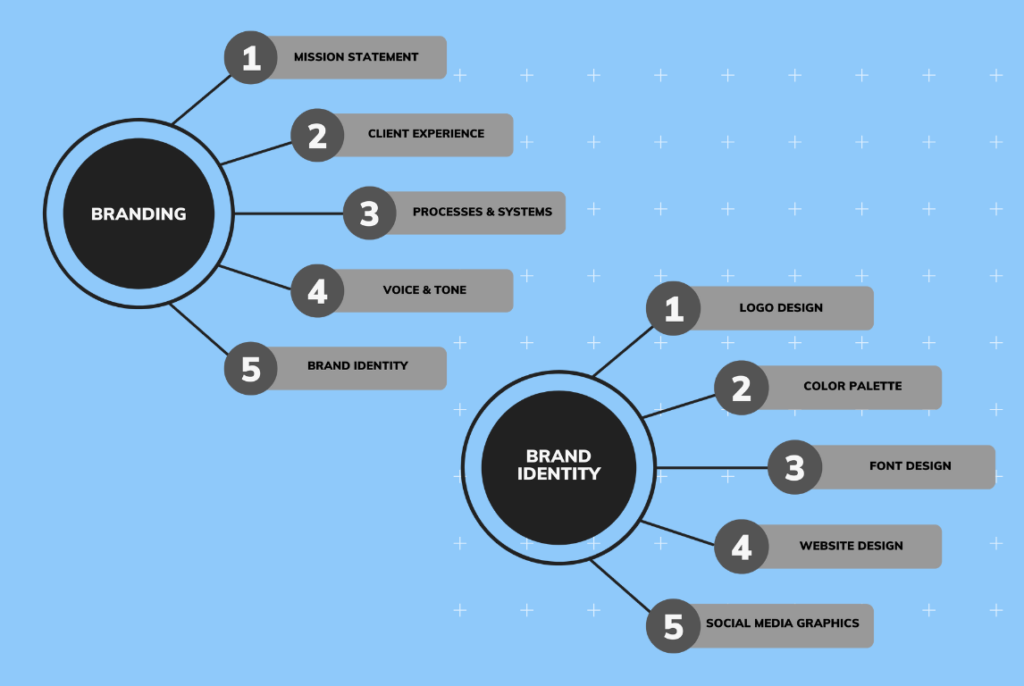
How do brand surveys help a business?
Brand surveys help businesses understand customers’ perceptions. These customized surveys gather valuable feedback and insights into your audience’s thoughts or feelings about your brand.
Without these survey-based insights, you’re running into the market blind and will inevitably waste tons of money and time.
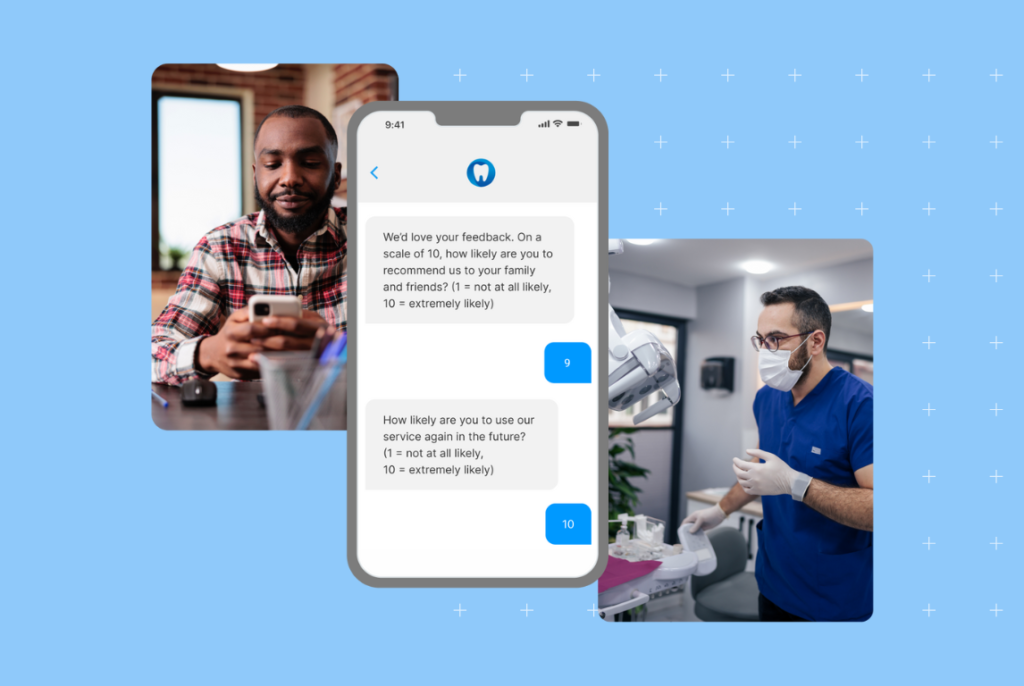
Instead, use brand surveys to learn what customers actually think about your brand.
Brand surveys enable businesses to:
- Ask them targeted questions about brand awareness, customer satisfaction, and the overall brand experience.
- Identify strengths to build upon and areas needing improvement.
- Make informed decisions to align your brand with customers’ expectations better and enhance brand perception.
Types of brand surveys
Brand surveys can be as different and unique as the various companies using them. Survey examples and types target different perspectives based on what you’re looking to measure. Here are the most common and effective brand survey types.
Brand awareness survey
What is a brand awareness survey?
If you want to understand how well your target audience is familiar with your brand, core product offerings, and brand identity, you must measure brand awareness. It is a good way to assess your brand’s popularity among your intended consumers.
Why are brand awareness surveys important?

A brand awareness survey is critical to measuring your brand’s recognition. The insights from these surveys can help you determine the effectiveness of your branding efforts.
Responses will shed light on those who don’t know your brand well too, outlining areas of improvement. Even if your business is experiencing great success, there always is scope for improvement when it comes to favorable awareness and expanding your brand impressions.
If that hasn’t convinced you, here are the three key benefits of conducting brand awareness surveys:
- Saves money on marketing: A brand awareness survey provides you with precise insights and data about how well your target audience knows your brand. This can save money on marketing by focusing on improving brand awareness efforts.
- Create efficient campaigns: A brand awareness survey highlights valuable metrics that companies can use to guide and launch better and more impactful marketing campaigns. For example, business owners can learn who introduced their customers’ to the business and target these demographics too.
- Differentiate your business from the competition: Your product or service will be more competitive if your brand identity is strong and customers are readily familiar with it.
Brand perception survey
What does a brand perception survey do?
A brand perception survey is vital as it helps your business understand how customers perceive your brand.
- It will give you insights into how current customers and prospective clients feel about your company, products, or services.
- As a result, you can know if they will trust you, buy from you, and recommend you to others.
- A brand perception survey also measures how your brand compares with your competitors.
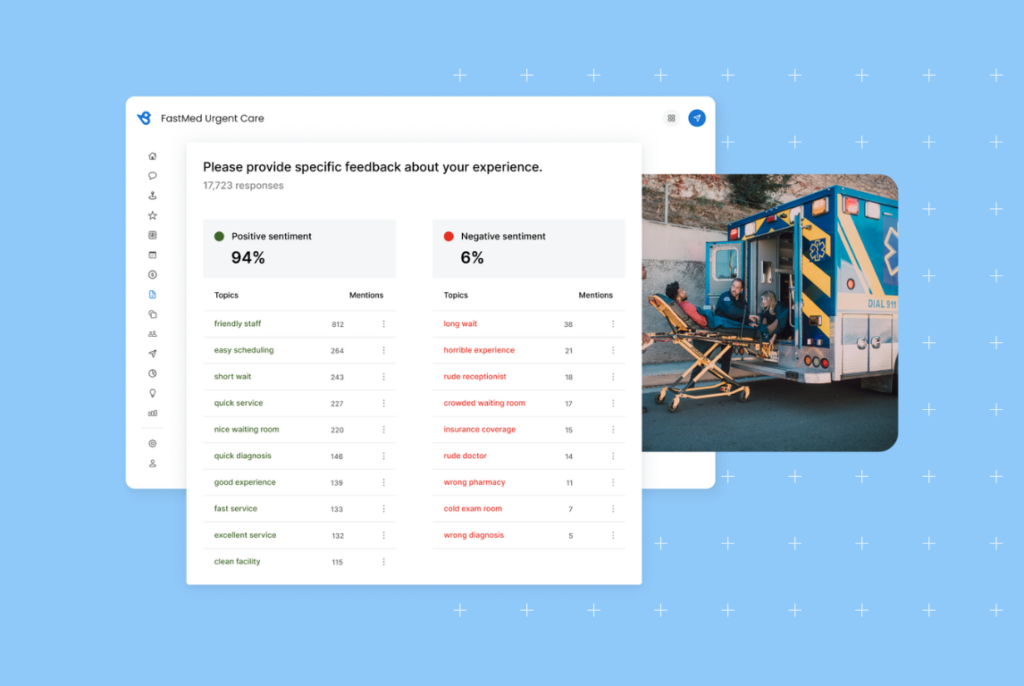
From this example, you can see that surveys can help you gauge the overall perception of your brand.
Who should you target for a brand perception survey?
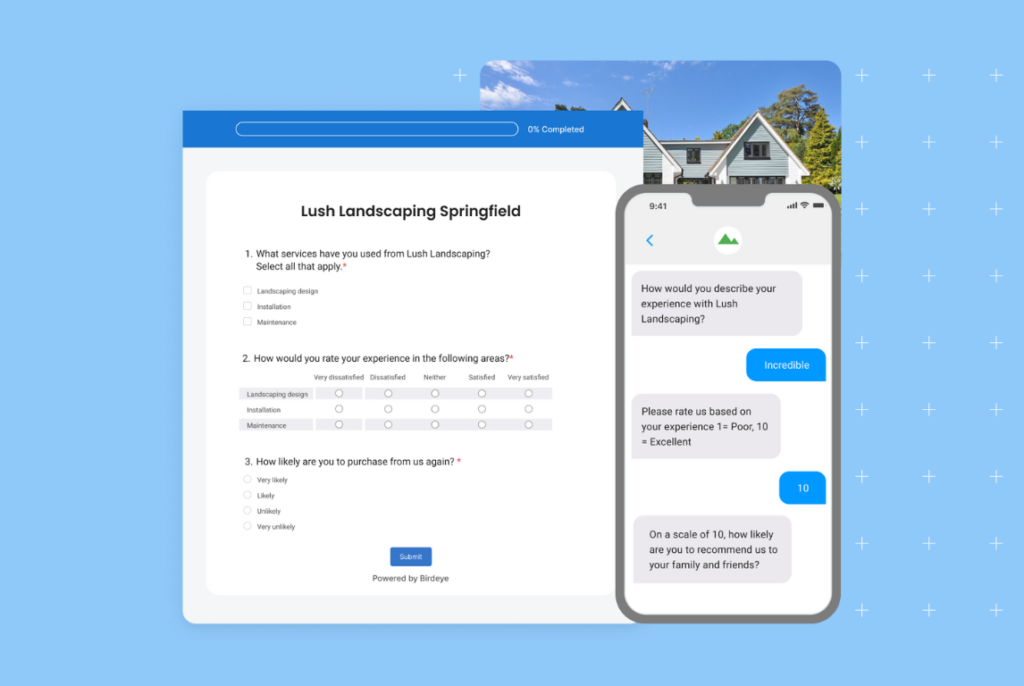
Brand perception surveys from existing customers can help you understand how to improve your services. From the example, you can see how simple questions can help you understand your audience better. You can find more brand perception questions in the following sections of the article.
- Existing customers: Your new and existing customers are the best audience for your brand perception surveys. They offer the best insights into how they view your brand since they have already interacted with your business.
- Potential customers: You may also send invites to potential buyers who have expressed some interest in your products/services. Their insights can help understand why they’re not converting and understand their expectations.
- Former customers: Customers that stopped buying from you are a great resource for gathering valuable feedback about why they left and areas where your brand may have fallen short.
- Competitors’ customers: Be sure to survey your competitors’ customers, as they can offer insights into how your brand is perceived compared to others in the market.
- Employees: Engaging your staff can help uncover valuable feedback on the brand’s internal culture, values, and overall perception.
What to include in your brand perception survey?
Consumers who care about your brand will form an opinion or perception based on four brand affinity factors: cognitive, language, emotional, and action.
- Cognitive: What customers associate or connect your brand with.
- Language/Descriptive: How customers describe your brand. Measuring the language customers use to describe your brand helps you determine their level of trust.
- Emotional: The feelings and emotions customers associate with your brand. Questions should gauge whether those feelings attract them toward your brand or push them away.
- Action: The experiences (positive or negative) customers have with your company.
Your brand perception survey should include these items to help you understand how your company aligns with your customer’s values and philosophy. We have formulated some questions you can use in the upcoming sections that cover these factors.
Brand positioning survey
What does a brand positioning survey do?
A brand positioning survey helps you uncover the unique value that your target market associates with your products or services. Brands use this survey to understand what makes their offerings unique and appealing to customers.
Using insights from brand positioning surveys, brands can consistently deliver value, distinguish themselves from the competition, and establish a unique position in their target markets.

Who is the target audience of your brand positioning survey?
- Current customers: Target your existing clients as they have a firsthand experience with your brand and have formed perceptions about it.
- Potential customers: These are people who might be interested in your offerings but have not yet made a purchase. Their responses will help you learn how to position your brand to attract and convert them effectively.
- Competitor’s customers: Analyze the perceptions and experiences of customers currently loyal to your competitor. Identify areas where your brand can differentiate itself to win them over.
- Employees: Your internal teams are a great resource for figuring out how to position your brand.
- Non-customers (general public): Feedback from non-customers allows you to understand why people are not buying from you or how to better position your product to make them buy.
What to include in your brand positioning survey?
A brand positioning survey should include precise questions that assess where your brand stands in the eyes of consumers. In other words, ask participants how they would rank your brand based on their experiences and perception.
Brand identity surveys
What does a brand identity survey do?
A brand identity survey evaluates a brand’s values, personality, and overall brand image. The brand identity survey allows you to understand if you are effectively communicating your brand’s core values and identity.
Use this brand survey to assess if your messaging, visual elements, and overall customer experience align with the intended perception. It can also assist in determining where your brand stands among competitors.

Who should be the target audience of your brand identity survey?
- Existing customers: Build loyalty and drive repeat business with your existing customer base. Their insights can provide valuable feedback on how well your brand aligns with their expectations and experiences.
- Potential customers: Understanding their perceptions and expectations can help tailor your brand messaging and positioning to attract them.
- Employees: Your employees can share insights into how well the brand values and identity are communicated within the company and how aligned they feel with the brand.
- General public: This group can offer unbiased opinions and insights that may uncover new opportunities or challenges.
What to include in your brand identity survey?
An effective brand identity survey will include all the questions needed to create a comprehensive profile of your brand in terms of voice, personality, and values. Ask your target audience directly what it is they value from your brand. You may additionally want to understand how your customers’ perceptions of certain elements of your brand fit with the intended brand image.
70+ Brand survey questions for your business
Many brand survey tools offer pre-designed survey templates with sample survey questions that you can customize based on your specific goals and brand. Use these most common questions to help you gauge brand awareness and perception.
Brand awareness survey questions
- How and when did you first discover or learn about our brand?
- On a point scale of one to 10, just how familiar are you with our brand?
- What was your overall impression of our brand?
- What brands first come to mind when you think of this particular product or service?
- What values do you believe our brand represents?
- How favorably do you think of or consider our brand?
- How has your overall impression of our brand changed over the past year?
- Which of the following terms or words do you feel best to describe our brand?
- What do you really like most about our brand?
- How would you describe our company brand to a friend or family member?
- Where have you previously seen or encountered our brand in the past year?
- Have you ever recommended our brand to others?
- What aspects of our brand’s marketing efforts resonate with you the most?
- Would you consider our brand to be trustworthy in representing our company?
- How frequently do you interact with our brand’s social media accounts or website?
- How well do you think our brand understands and meets your needs?
Brand perception survey questions
- Are you familiar with X brand?
- What do you associate our brand with when you encounter it?
- Choose the expression or phrase you think best describes our brand.
- How likely are you to positively recommend our brand to others?
- How would you describe our brand and company to a friend?
- On a general rating scale of one to 10, just how satisfied are you with your experience encountering our brand?
- What aspects of our brand do you find most satisfying?
- Is there anything about our brand that you find dissatisfying?
- How well do you think our brand understands and meets the needs of its consumers and target audience?
- How has your overall perception of the brand changed over the past year?
- How would you personally rate the overall quality of our products/services?
- In your honest opinion, what sets us apart from competitors in the market?
- How would you rate the inherent value for the money offered by our brand?
- How frequently do you engage with our brand’s content on social media platforms?
- Do you feel our brand is consistent across different touchpoints (e.g., website, social media, physical stores?)
- Do you feel our brand aligns with your personal values and beliefs?
- How likely are you to make the switch to a competitor’s brand in the near future?
- How well do you think our brand communicates its key messages to the target audience?
Brand positioning survey questions
- Who do you think our brand is made for, ideally?
- Can you mention what you think we specialize in as a core offering?
- Did our product/service help solve your problem?
- What other brands or companies did you consider before choosing us?
- Why did you choose our brand over the competitor?
- What adjectives would you use in describing our brand?
- How does buying/using our products/services make you feel?
- How would you describe your last or most recent experience with our brand?
- What influenced you to switch service providers?
- How has your personal perception of our brand changed over the last six months?
- On a scale of one to 10, rank these brands on pricing/features/reliability.
- Which brand or brands are you most familiar with from the list above?
- How would you describe our brand’s overall personality or character?
- How would you rate the high-value quality of our offerings when compared to our competitors?
- In which situations or occasions do you think our brand is most relevant or useful?
- How well do you think our brand communicates its unique selling points or key advantages?
- How do you perceive our brand’s pricing in relation to the value it provides?
- Which online channels or platforms do you primarily associate with our brand?
- What improvements or changes would you suggest for our brand to enhance its market position?
Brand identity survey questions
- How are you familiar with our brand identity? [Ask them to pick logo, symbols, or mascot from a list]
- What is the very first thought that springs to mind when you encounter our brand?
- Which of the following listed words or phrases best represent our brand?
- How would you describe or share our brand with a friend or colleague?
- How well do you think our brand aligns with your values and lifestyle?
- Compared to our competitors, what do you think sets us apart?
- How do you personally perceive the quality of our products/services?
- What emotions or feelings does our brand evoke in you?
- Which of the following elements (e.g., logo, color palette, social media presence, etc.) do you associate with our brand?
- How well do you think our brand communicates its values and voice?
- What would you like to see bettered or changed about our brand?
- On a point scale of one to five, rate your overall satisfaction with our brand.
- How likely are you to remain loyal to our brand in the future?
- Do you feel our brand represents high quality?
- How consistent is our brand’s messaging across different channels (website, social media, etc.?)
- How do you most often interact with our brand (purchasing, following on social media, visiting the website, etc.?)
- How likely are you to further recommend our brand to others?
Best tips to conduct brand surveys
Now that you understand the questions to include in your brand surveys, here are a few tips and suggestions for making the absolute most of your efforts.
Find the right audience
Brand surveys are only helpful when they’re conducted regularly within your target audience. If you want to gain relevant and valuable insights and brand-related data, ask the right questions to the right people. This could be your existing clients, former customers, industry experts, employees, and even your competitor’s customers.
Conduct timely surveys
Timing is everything, especially when it comes to brand surveys. The key to effective brand surveys is getting customers to think about their recent experiences with the brand, usually within 48 hours of the encounter. Also, consider what events are occurring in your business, and prepare corresponding surveys.
Reward customers for answering truthfully
Reward participants when they complete your brand surveys. Doing so encourages them to participate, which puts you in a better growth position to learn more about them. Offer rewards like points, discounts, exclusive memberships, and more.
Personalize the surveys
Use a survey template to make your brand survey appealing. This will help captivate your audience and prompt them to share feedback. Include the customer’s name in the greeting in a tone that matches your brand.
Ask general questions
A survey template that is easy to answer will garner greater participation. Ask general survey questions as they allow all participants to respond.
Show customers that you are working on the feedback
Perhaps the most critical part of conducting an effective survey is what happens after completion. Start by analyzing your data based on your NPS scores to isolate customer segments and generate more insights on how your audience feels about your brand.
Your promoters (customers who rank the brand highly) are your brand ambassadors, so focus more attention on them. Keep the dialogue going with those promoters.
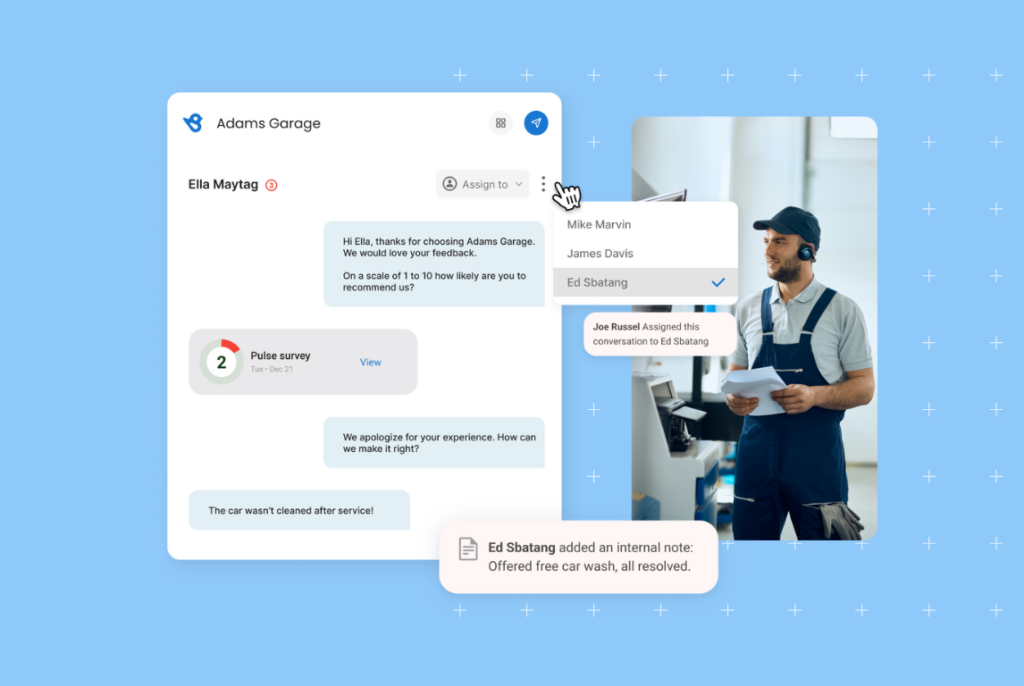
However, don’t neglect the detractors (customers who rank the brand poorly.) Ask them what was negative about their experiences. Be willing to invest time in improving the customer experience to enhance your brand image.
Use a survey tracking tool
Regularly check your survey’s progress and track the responses received by using the most efficient survey management and tracking tools. Use a survey tracking and automation tool like Birdeye to collect customer feedback and then track key metrics like brand awareness, loyalty, and perception. These tools are effective for collecting data and for brand tracking. In addition, they provide more specific insights to improve your brand performance.
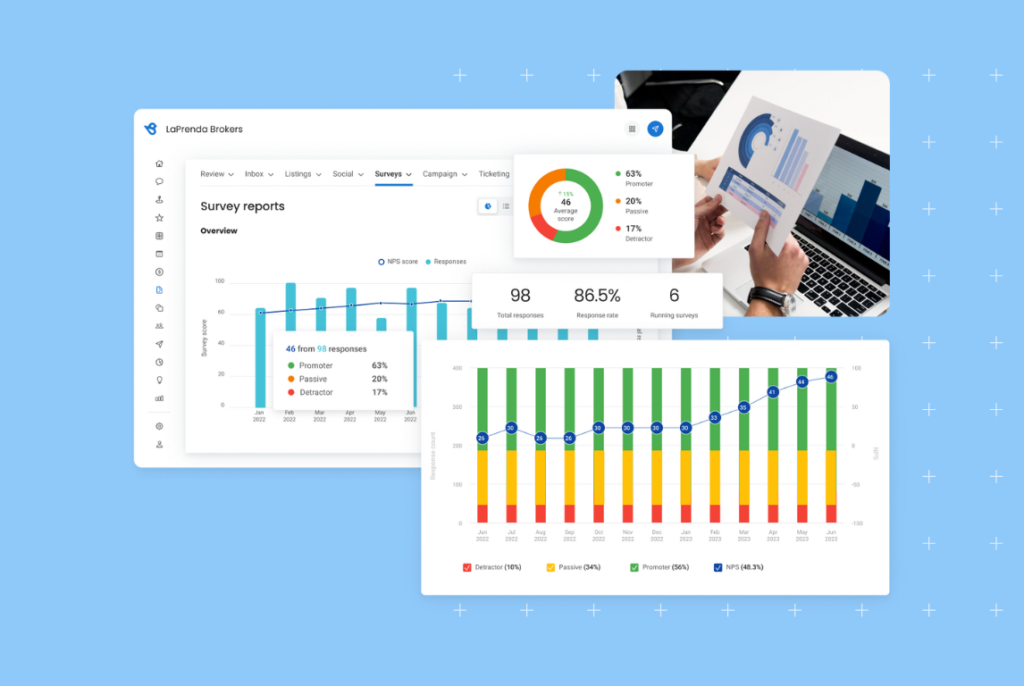
Frequently asked questions about brand surveys
Be consistent and dedicated to your survey efforts. Create ongoing survey timelines, strategies, and questions for frequent and ongoing use.
A survey that aims to assimilate information about customers’ perceptions and experiences to improve brand performance is a brand survey. Apple uses customer satisfaction surveys and brand surveys, for example.
Companies pay individuals to take surveys because they want to gather valuable information about consumer preferences, opinions, and behaviors. Since they want better results, they offer rewards customers for them in answering surveys.
Build your brand with right surveys
Maximizing customer satisfaction can boost sales, develop brand loyalty, and generate higher brand awareness. Brand surveys are a great starting point for building your brand image and gathering insights about what your target audience actually wants.
For a smoother process, automate the survey process so that every customer automatically gets a survey post an interaction. With Birdeye Surveys, you can not just automate sending surveys, but action on negative feedback, turn survey responses into reviews, analyze results, and understand overall sentiment.
Talk to a Birdeye expert to know more.

Originally published



